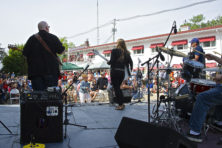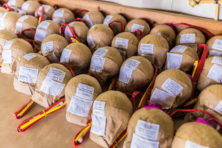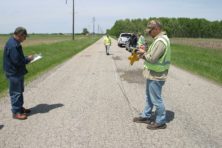How Forestville Got Its Name
- Share
- Tweet
- Pin
- Share
Sometimes it’s not so much about how a place got its name as it is about who gave it the name. And if those names seem obvious or without imagination, you have to remember that the folks who gave the names to places on this peninsula were pioneers trying to hew subsistence existence and, eventually, community, out of what was nothing more than an untamed land, arrived at by boat due to the inland forests and lack of roads. Who had time for imagination in such conditions?
From our 21st-century perspective, the name Forestville — for both a village and town in southern Door County — sounds like an obvious story: it was hugely forested.
But why Forestville rather than Forestburg or Foresttown?
The common municipal suffix “ville” (Knoxville, Louisville, Nashville, Shelbyville and Hooterville, for example), is a post-Revolutionary War affectation.
Before that we took names directly from the old country — New Amsterdam (a.k.a. New York) — or we added a form of “town” or “burg”/“borough” to community names such as Charles Town, or Charleston, South Carolina; and Pittsburgh, Pennsylvania. During and after the Revolutionary War, we took up the suffix “ville” in homage to our French allies.
So can we fault the founders of Forestville for their lack of imagination? Certainly not. They were perfectly in tune with their times because — think of this — a place with that name sounds like a place of abundance, and people might want to come to such a place.
According to Door County historian Hjalmar Holand, the founding fathers of the community arrived in Forestville completely by accident. In his The History of Door County, Wisconsin: The County Beautiful, Holand tells the tale of four Irishmen — John, Richard and Matthew Perry and James Keogh Sr. — who were on their way via steamer to the lead mines of Galena, Illinois, in May 1855 when the ship stopped in Manitowoc and the four men took a stroll, only to be stranded when the steamer left the dock without them.
As they stood on the pier cursing the steamer as it sailed away, a man who introduced himself as Major Joseph McCormick — “the first white man to settle in Forestville,” Holand tells us — told the quartet they should be happy not to be heading to the $1-a-day lead mines when they could go to his new town 40 miles north.
According to Holand, this is what he told the men about his new town in Door County: “I have a sawmill, a hotel and a townsite there. The timber is grand, and the soil is excellent. We have a fine waterfall to give us cheap power, and we intend to start a blast furnace. We have discovered a deposit of choice marble near by. All we need to make a first class city is men and we are willing to pay them better wages than anywhere else in America. You come with me and you will get the right start.”
Since the next boat for Chicago wouldn’t arrive for another week, the men decided they might as well check it out. McCormick had a small sailboat (a Mackinac boat, Holand calls it), in which the five men sailed to Algoma (called Ahnapee at the time) before poling their way up the Ahnapee River to McCormick’s “town.”
Unfortunately, they quickly learned that the major was a big blowhard — or as Holand put it, “His sawmill did not exist; his hotel was only a wretched little hut; the rushing waterfall which was to drive the wheels of industry in the new city was only a small rapids. The marble deposit, as they later discovered, was merely a layer of smooth limestone. The timber, however, was there: a huge forest shutting them in on every side.”
Yet the men stayed, and before seeing his dreams of growth in Forestville dashed due to lack of capital and moving to Algoma, McCormick lured so many other settlers to the area that by 1857 there were enough residents living there that steps were taken to organize what would be the third town in Door County, joining Washington and Otumba, later Sturgeon Bay, as the first two incorporated towns.



